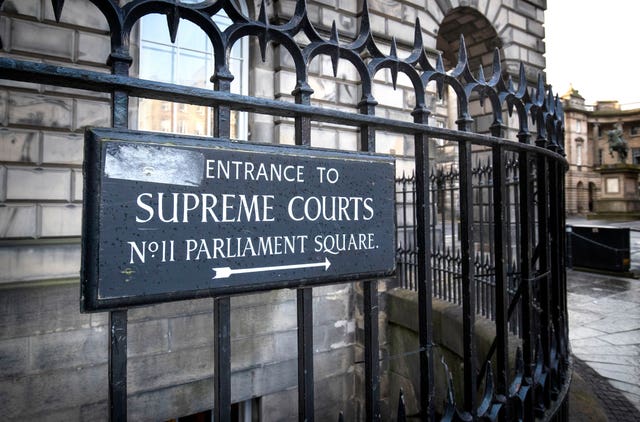
Voters in May’s Holyrood election need to know if Scotland can hold a second independence referendum without the consent of the UK Government, a court has heard.
Martin Keatings has taken a case to Scotland’s Court of Session, seeking a declarator of the court that the Scottish Parliament has the power to legislate for another referendum.
He is part of the Forward As One group being represented by Aidan O’Neill QC in the case against the Advocate General and Scottish ministers, in a virtual hearing before Lady Carmichael.
Mr O’Neill suggested that as part of their case, the defenders are “saying it is in the public interest they are kept in ignorance on an issue of law and the constitution which the current Scottish Government has said its party will run on in and make an election issue in the imminent Scottish Parliament elections”.
He told the court Mr Keatings is instead the one representing public interest in the litigation, and expressed dismay at the defenders who “would insultingly call him a mere busybody”.
The QC added the “answer is absolutely required in order to inform votes of ordinary citizens in forthcoming Scottish elections”.
Brexit, in the circumstances and withdrawal from the EU has resulted in diminution of the rights available to the Scottish Deamos…" Aidan O'neill | #peoplesas30
— Martin J Keatings #VoteAFI2 (@MartinJKeatings) January 21, 2021
Mr O’Neill “readily accepted” that any unilateral declaration of independence, which he described as a revolutionary act, would breach constitutional order.
He added there is “no argument that a potential referendum on potential independence can be said to relate to the reserved matter or breach section 287 of the Scotland Act”.
The court heard it described as a “perfectly coherent case” and that the “purpose of independence referendum is one of consulting the people of Scotland about the possibility of future constitutional change in the UK”, which Mr O’Neill said is fully in accordance with the principle of democratic accountability.
He also highlighted the impact of Brexit, suggesting the “withdrawal of the UK from the European Union has resulted in a fundamental diminution of the rights available to members of the Scottish demos in terms of their own free movement”.
With a short time to reply on Thursday afternoon, David Johnston QC, for the Advocate General, began by saying the case “ought not to be in this court in the first place” and it should be a matter for the UK Supreme Court.
For this reason, Mr Johnston told the court there is no need for it to consider Mr Keatings’s interpretation of the Scotland Act.
He also said there is “no quarrel with democracy” – in response to Mr O’Neill’s submissions earlier in the day – and the importance of its values.
Mr Johnston suggested what is missing from that argument is recognition of a representative democracy and “not every decision is taken by the electorate, rather they elect their representatives” as the “form of democracy we have chosen”.

A legal opinion for Forward As One was first published by Mr O’Neill in December 2019, on the constitutionality of the issue after Prime Minister Boris Johnson refused to grant a section 30 order.
Such an order – under the Scotland Act 1998 to pass laws normally reserved to Westminster – was granted by the UK Government ahead of the 2014 independence referendum in which Scotland voted to remain part of the UK by 55.3% to 44.7%.
Fundraising by Forward as One began in January last year for legal fees, with the Crowd Justice page – https://www.crowdjustice.com/case/pas30/ – currently sitting at just over £196,000.
The website has around 6,800 pledges but Mr O’Neill told the court 10,000 people are backing the campaign.
He added that if Forward As One’s case is successful, the members will seek expenses on the basis that the case was not pursued for Mr Keatings’s personal gain but to vindicate their “public rights as ordinary voters”.
Mr O’Neill also praised the work and crowdfunding of Mr Keatings – who is standing as an independent candidate for Mid-Scotland and Fife in the vote on May 6 – saying the country “should be encouraging this kind of political engagement” out with Parliament.
The hearing continues on Friday, with more submissions expected from Mr Johnston and from James Mure QC, who represents Scottish ministers.


Comments: Our rules
We want our comments to be a lively and valuable part of our community - a place where readers can debate and engage with the most important local issues. The ability to comment on our stories is a privilege, not a right, however, and that privilege may be withdrawn if it is abused or misused.
Please report any comments that break our rules.
Read the rules hereComments are closed on this article